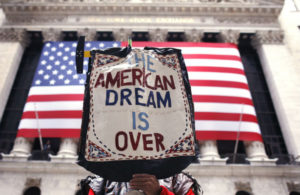Earlier today I wrote on my twitter: “Most of my friends on the political left, and some on the right, say the #AmericanDream is over. Do we have a new mythology to replace it?”
And I was asked by a friend to clarify; so here goes. 🙂
For the sake of the exercise, let’s say that the “American Dream” is two propositions: 1: “Equality of opportunity for all (if not equality of everyone’s eventual final position)”, and 2: “any person who is talented and hard-working can make it rich, or famous, or otherwise materially successful.”
The idea of the American Dream is a nation building mythology. It galvanized America for decades, perhaps for two centuries; it gave people a sense of purpose and of initiative; it was hopeful and optimistic; it defined clear and measurable goals. It was for America the equivalent of France’s “Freedom, Equality, Brotherhood”, or Canada’s “Peace, Order, and Good Government”. You knew that when you were talking to someone who wanted “success” and who believed (quite rationally) that he had a fair chance to get it, that you were talking to an American. Or, anyway, someone inspired by America.

I read a poll today that said 59% of Americans think the American Dream is unacheiveable. Among those friends of mine who discuss such matters, those on the political left gave up on the American Dream many years ago. They point to the fact that there is no such thing as equality of opportunity in America today, given the wide disparity between the rich and the poor; they also observe that many talented and hard-working people nonetheless remain “unsuccessful” (in that narrow materialist sense of ‘success’) because of various systematic injustices. They also observe that many people become materially successful without any talent at all, but instead they succeed because of inheritances or privileges or sheer dumb luck. I also have a few friends on the political right who also believe the American Dream is basically finished, although they point to different reasons. For instance, some of them think that getting “success” in the narrow materialist sense isn’t especially important anymore. Others look to some feature of the welfare state and/or the social safety net, and argue that it creates a disincentive for individual effort.
My question is: suppose we assume that the American dream is, in fact, over and gone. What, if anything, is rising up to replace it?
I suppose this is partially a factual question (ie. what is replacing it?) and also a moral one (i.e. what should replace it?). I am as interested in how people interpret my question, as I am interested in their answers.
But I think it is a deeply serious question. A nation without a mythology has nothing to galvanize it. Its people no longer identify with it, often long before they are willing to admit as much to themselves. Should the nation come under attack, or be paralyzed by injustice and by corruption in its high places, the people might not come to its defense. The mythology isn’t there to grant the necessary glamor of heroism to the effort to protect the nation or to right its wrongs. But they might come to the defense of different mythologies, different worldviews, different ideals, which also possess the power to galvanize people and direct their initiative and energy toward clear and measurable goals, even if they call that new and different worldview by the same old name. And I am interested in what different mythologies might be emerging today, and perhaps which of them should “succeed”.
I’m not an American myself. But I am a person who lives on this world and who cares about what might happen to it while its only superpower nation undergoes an agonizing revision of its identity.

One Response to The American Dream: What next?